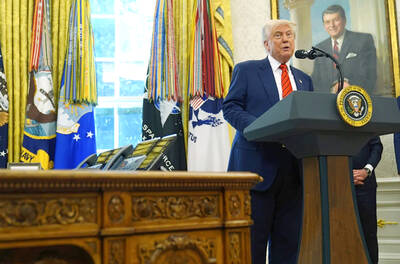Japanese Prime Minister Junichiro Koizumi yesterday defended his visits to a Tokyo war shrine, telling parliament that only two countries -- China and South Korea -- have complained about them.
Koizumi has faced regular criticism for worshipping at five visits to Yasukuni Shrine, which honors Japan's war dead. The shrine also honors executed war criminals, and Japan's neighbors have objected to the visits.
Under questioning in parliament, the prime minister rejected criticism that his visits had damaged Japan's standing in the world.
"I made my visits as prime minister, but I am also an individual and the constitution guarantees freedom of thought," Koizumi said.
"China and South Korea are the only countries that criticize my visits," he continued.
"No [other] prime ministers criticized my visits. President Bush never criticized the visits. Japan has reflected on the war and made progress peacefully," he said.
However, China and South Korea have been highly critical of the visits, which they see as glorifying Japan's militarist past. Chinese anger over the visits have played a role in blocking meetings between Koizumi and Chinese leaders in recent months.
"Under Junichiro Koizumi's premiership, Japan's diplomatic isolation ... has become serious," said Tadayoshi Ichida, of the Japan Communist Party. "The reason is because the prime minister has visited the Yasukuni shrine for the fifth consecutive year."
Koizumi has made annual visits to Yasukuni since taking office in 2001, most recently in October.
The shrine honors 2.5 million war dead and hosts a museum that displays a sympathetic view of Tokyo's conquests in East Asia from the late 19th century until the end of World War II.
Koizumi, however, has distanced himself from that view, arguing that he prays for peace at the shrine.
"My visit to Yasukuni shrine and Yasukuni's point of view are two separate issues," he said.
Meanwhile, South Korea's President Roh Moo-hyun said yesterday that he would keep pressuring Tokyo over allegations that Japan is not properly facing up to its wartime misdeeds in Asia.
"I think [we] need diplomacy, in which we should properly demand what we should demand, protest what we should protest and reject what we should," Roh said in a nationally televised news conference.
"We will make various efforts to ensure our legitimate demands are met, and we won't abandon them," he said.
Roh did not specify any demands, but urged Japan's Prime Minister Junichiro Koizumi to consider South Koreans' sentiments about Koizumi's visits to Yasukuni.
Seoul-Tokyo relations have seriously frayed in recent years over several issues, including Japanese school history textbooks that critics say gloss over the country's wartime atrocities, and Koizumi's repeated shrine visits.

A new online voting system aimed at boosting turnout among the Philippines’ millions of overseas workers ahead of Monday’s mid-term elections has been marked by confusion and fears of disenfranchisement. Thousands of overseas Filipino workers have already cast their ballots in the race dominated by a bitter feud between President Ferdinand Marcos Jr and his impeached vice president, Sara Duterte. While official turnout figures are not yet publicly available, data from the Philippine Commission on Elections (COMELEC) showed that at least 134,000 of the 1.22 million registered overseas voters have signed up for the new online system, which opened on April 13. However,

ALLIES: Calling Putin his ‘old friend,’ Xi said Beijing stood alongside Russia ‘in the face of the international counter-current of unilateralism and hegemonic bullying’ Chinese President Xi Jinping (習近平) yesterday was in Moscow for a state visit ahead of the Kremlin’s grand Victory Day celebrations, as Ukraine accused Russia’s army of launching air strikes just hours into a supposed truce. More than 20 foreign leaders were in Russia to attend a vast military parade today marking 80 years since the defeat of Nazi Germany in World War II, taking place three years into Russia’s offensive in Ukraine. Putin ordered troops into Ukraine in February 2022 and has marshaled the memory of Soviet victory against Nazi Germany to justify his campaign and rally society behind the offensive,

CONFLICTING REPORTS: Beijing said it was ‘not familiar with the matter’ when asked if Chinese jets were used in the conflict, after Pakistan’s foreign minister said they were The Pakistan Army yesterday said it shot down 25 Indian drones, a day after the worst violence between the nuclear-armed rivals in two decades. Pakistani Prime Minister Shehbaz Sharif vowed to retaliate after India launched deadly missile strikes on Wednesday morning, escalating days of gunfire along their border. At least 45 deaths were reported from both sides following Wednesday’s violence, including children. Pakistan’s military said in a statement yesterday that it had “so far shot down 25 Israeli-made Harop drones” at multiple location across the country. “Last night, India showed another act of aggression by sending drones to multiple locations,” Pakistan military spokesman Ahmed

US President Donald Trump on Wednesday said that he would make a decision about how the US government would refer to the body of water commonly known as the Persian Gulf when he visits Arab states next week. Trump told reporters at the White House that he expects his hosts in Saudi Arabia, Qatar and the United Arab Emirates will ask him about the US officially calling the waterway the Arabian Gulf or Gulf of Arabia. “They’re going to ask me about that when I get there, and I’ll have to make a decision,” Trump said. “I don’t want to hurt anybody’s